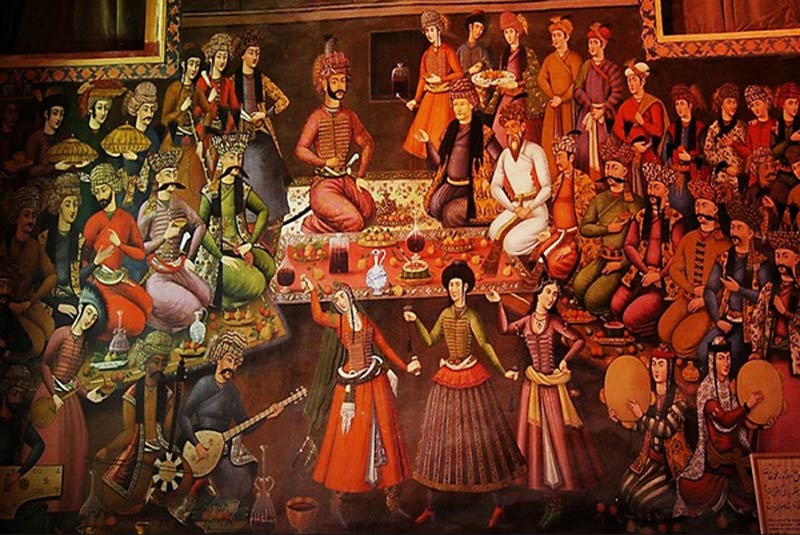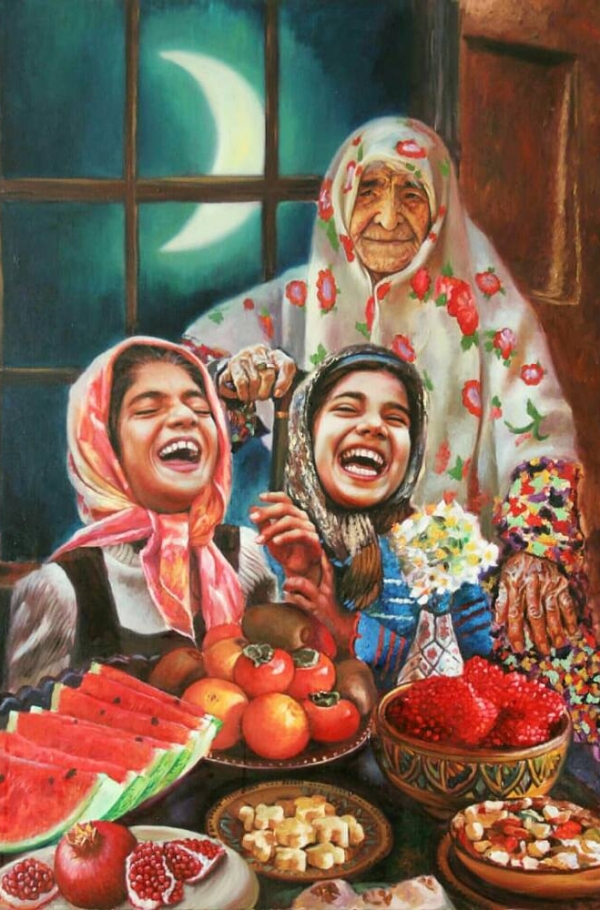Shabe Yalda, or Yalda night is an evening of festivities and merriment that begins when the sun sets on the last day of fall (last day of Maah e Azar on Jalali Calendar) and continues until the dawn of the first day of winter, or first day of Maah e Dey.

Boraq Hamim Art News Site reported: The ancient Persians depended on agriculture for their livelihood and had to plant and gather according to the change of seasons. By experience they learned that the longer days and warm rays of sun helped their crops and the gathering months brought shorter days and longer nights. They discovered that after what was the longest night of the year the daylight hours started to get longer.
Shabe Yalda
This night was called Yalda which meant rebirth (of the sun), and it was celebrated for the triumph of light over darkness. They built fires on sundown of the last day in fall and kept them burning until the first rays of sun the following day. During this night they gathered with family and friends, ate delicious food, drank, and sang happy songs all night and listened to stories about old times.

To this day Yalda remains as one of the most ancient festive ceremonies that has been celebrated in Iran for centuries since the time of the Persian Empire. Besides Iran, Yalda is celebrated in Tajikistan, Afghanistan, Azerbaijan, Armenia and some ceremonies similar to Yalda are also celebrated in Pakistan and Northern India at about the same time of the year. By tradition Iranians gather in the homes of the elders of family on yalda night, eat, drink tea and sharbat (sweet drinks made by mixing homemade fruit syrup and water) and be merry. The main Yalda fruits are watermelon, pomegranate, persimmons, apples and pears, though other fruits such as oranges, tangerines and kiwi are also available in Iran at this time of the year. In old times the summer fruits such as watermelon, pears and apples were kept from spoiling in a special cold storage called “anbar.” Nowadays these fruits are imported fresh from the warmer areas.
The ancient myth is that eating hendevaneh هندوانه (watermelon) on Yalda night makes the person immune to cold winter weather as well as the next summer’s heat. In old times summer watermelons were buried under branches and leaves in a cold place to keep them fresh until the Yalda night. In some parts of Iran the family of the groom to be sends a well decorated watermelon along with different fresh and dried fruits as well as presents and jewelry to the home of his future bride.
.jpg)
Nuts (ajil), and dried fruit (khoshkbar) are eaten on Yalda night. The special foods that are prepared for this night change from family to family and also depend on the availability of ingredients in different regions of Iran. The variety is endless but to mention a few: Mahi Polo, Fesenjoon, Khoresh Bademjan, Aash Reshteh, and traditional desserts such as Fereni and Sholeh Zard may be prepared for this night.
During this night Persians enjoy delicious food, sweet and juicy fruits, and delectable sweets paired with hot tea. Reading the enchanting poems by Hafez حافظ, and great Persian mythology such as Shahnameh شاهنامه , Khosro va Shireen خسرو و شیرین, Leili va Majnoon لیلی و مجنون make this otherwise cold winter night a delightful gathering with family and friends. Yalda is a night full of hope for the future and happiness for the young and old. َThere is a saying in Farsi that goes something like this: I wish you a long and happy life like Shabe Yalda, sweet as watermelon and fruitful as pomegranates! Shabe Yalda mobarak.”Happy Yalda Night”!!
Message End/






More Stories
Analysis of spring and summer in 2025 trends by Pascaline Wilhelm
Clothing with Iranian Brand
Iranian and Islamic Attire